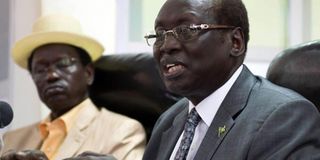There was no reason for East Africa’s media to go for South Sudan’s jugular

South Sudan's Minister for Foreign Affairs, Dr Marial Benjamin, during a press conference in Juba on April 18, 2014. FILE PHOTO | CHARLES ATIKI LOMODONG |
What you need to know:
- Patriotic frenzy against perceived South Sudan’s hostile attitude towards Ugandans and Kenyans became the overwhelming coverage trend.
- South Sudan media definitely needs the East African media because we still have a long way to go.
That South Sudan would sooner or later come up with labour regulations should not have been an issue for our neighbours.
All countries have such laws, which make the employment of their nationals a priority.
Except for some specialised posts that call for the employment of non-nationals, the rest of the positions are usually the preserve of nationals.
That was clearly the intention of our labour policy.
Why then the hullabaloo?
Some have said it is the way the policy was presented to the public by the Minister for Labour. And there is some truth in that, otherwise his colleague, the Minister for Foreign Affairs, Dr Marial Benjamin, would not have tried so hard to close the gate after the horse had bolted.
But by then, the East African media (Kenya and Uganda) had already smelled blood and immediately jumped into unwarranted indignation.
Patriotic frenzy against perceived South Sudan’s hostile attitude towards Ugandans and Kenyans became the overwhelming coverage trend of what should have been accepted as normal.
For some reason, it does not seem right to this media that South Sudan has the right to put its labour laws into practice because to do so would affect the interests of their own nationals, estimated as over a million by now.
Most of these people are in occupations as low as street and house-cleaners, domestic cooks, waiters in restaurants and hotels, porters, and even prostitutes and common thieves — if the latter can be described as occupations needing protection!
The fact that such a long honeymoon, since 2005, for all sorts of labourers from our neighbours would sooner or later be challenged and replaced by legitimate trade relations between nations, is lost in all the misleading streams of castigation.
NOT BEEN GOOD STEWARDS
What has the fact that thousands of refugees from South Sudan lived in camps and were educated in East Africa got to do with South Sudan’s labour laws?
What has the fact that thousands of South Sudanese continue to go to schools and universities in East Africa got to do with it?
Yes, I can understand part of why the East African media have come to hold South Sudan and its people in such a low esteem.
We have not been good stewards of our country’s considerable wealth since 2005.
Our leaders have shamelessly invested in these same East African countries, in luxurious real-estate property bought with hard cash, as well as shameless entertainment in expensive hotels and tourist resorts.
Our leaders and public servants pay heavily in East African hospitals for health checkups, while they do little or nothing about healthcare in their own country.
Yes, our often arrogant exhibition of stolen wealth, where humility would have been appropriate, is partly responsible for the way we have suddenly become lowly regarded in our region!
We cap it all by failing to find political accommodation and resorting to a devastating war within.
Then we dare to come out publicly with a policy that would lend itself to misinterpretation by the East African media!
LONG WAY TO GO
Should we not have lobbied our neighbours, indeed, their media, about such a policy? No. Our own presumptions about our international legitimacy clouded better judgment.
This is not a tit for tat from the South Sudanese media. As a budding media in the region, it would be total stupidity for us to start a battle with the giants of our region.
South Sudan media definitely needs the East African media because we still have a long way to go. We urge them to teach us what it means to be a productive media — indeed, what it means to be a journalist.
All I can ask of the East African media is to lead our region into peace and harmony, desisting from seeking popularity at the expense of their developing neighbour.
Perhaps we need to dialogue amongst ourselves for the good of our region.
Mr Akol is editor of the Gurtong Trust Website and Gurtong Focus monthly magazine. He has been chairman of the Association for Media Development in South Sudan since 2004.




